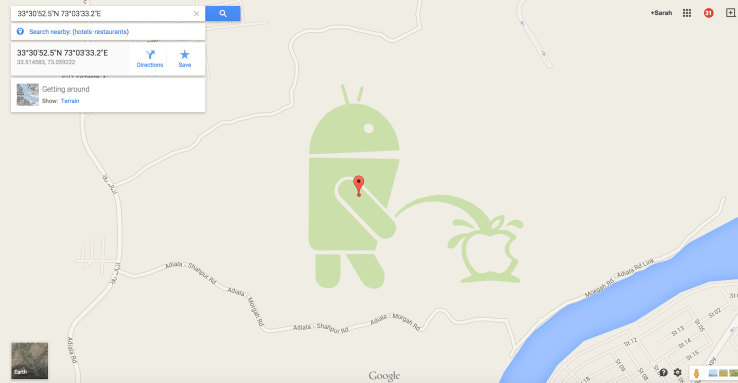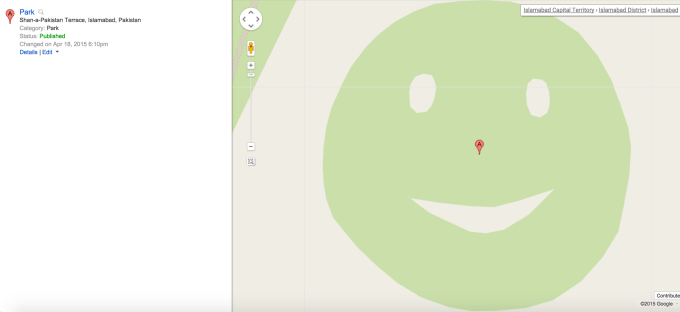
Google says it’s working to improve its spam-detection systems in its Google Maps platform after yet another prank allowed a user to upload an inappropriate image to Google Maps. This most recent image, which showed the Google Android mascot urinating on the Apple logo in the style of those unfortunate Calvin and Hobbes bootleg decals, was apparently uploaded by a Map Maker user “nitricboy” yesterday, according to his user profile page on Map Maker.
The user, apparently, enjoyed sneaking in bad edits to Google Maps – he also was able to get a Skype logo through, as well as a happy face, as contributors on Hacker News have since pointed out.
Map Maker, for those unfamiliar, is a years-old online tool that allows users worldwide the ability to upload new data to Google’s online mapping service – particularly in less-developed regions where detailed local maps had yet to become available. The idea is that users would be able to add details to maps that Google didn’t already have – like new roads or points of interest.

In the case of the recent “hack,” the user submitted the image as a “park,” for example, located on the outskirts of Rawalpindi, a Pakistani city 10 miles southwest of Islamabad.
The Map Maker platform, like many that rely on the power of crowdsourcing, lets anyone submit and edit. These edits are then approved by a community moderation process. However, it appears that it’s fairly simple for users to create additional accounts in order to “approve” their obscene edits. Or, in other cases, users approve the edits because they’re in on the joke or just want to be.
That’s led to some problems for Google Maps in recent days, it seems.
In addition to Map Maker, users have found other ways to hack their pranks onto Google Maps.
For instance, earlier this month, someone uploaded a new business listing located in the White House dubbed as “Edwards Snow Den.” (Get it?). That particular joke originated as a verified business listing on Google. The prankster realized that you could change the name and location of a business listing after its creation, and adjusted it to read “1600 Pennsylvania Avenue.”
The extensibility of Google Maps’ platform has been a longtime advantage for the company, whose maps are believed by many to be the best on the market. And Google notes today that contributed content from its user community as well as their edits are generally accurate and have positive and beneficial impact on their local community and businesses.
That being said, the company admits it needs to find ways to improve how it detects, prevents and handles bad edits. “Handling spam is a complex issue and we’re continuously working on ways to improve our systems, including new ways of preventing, detecting and taking down incorrect edits,” a spokesperson said regarding the new hack, which has now been broadly covered by major news outlets, some of whom even speculated it was a Google “Easter Egg.”
“We’re sorry for this inappropriate user-created content; we’re working to remove it quickly,” the Google spokesperson added.
Currently, the company relies on a combination of systems to detect and prevent map spam, including community flagging. (That’s where other users can flag content as being inappropriate or inaccurate.) But this is only one of many tools used to stop spam.
However, when bad edits fall through the cracks and actually make it onto the maps, Google then uses its understanding of what happened in order to integrate new reinforcements into its system.
But it’s unclear specifically what action Google will take to lock down Maps in the face of future pranksters. Especially because it seems like other users with a good history of edits helped “approve” these changes, which would have made the edit difficult for bots to catch. After all, the power of good content comes from the strength of the online community – and that will require more effort than an algorithm tweak to fix.







No comments:
Post a Comment